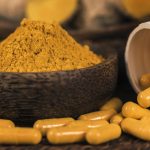by: June 28, 2024
 (NaturalHealth365) If you love Indian or Thai food flavored with curry, get ready for a pleasant surprise. In addition to being delicious, these foods have real health benefits. A comprehensive review published in Phytotherapy Research highlights that the co-supplementation of curcumin and piperine significantly reduces depression symptoms by enhancing curcumin’s bioavailability and its anti-inflammatory and antioxidant effects.
(NaturalHealth365) If you love Indian or Thai food flavored with curry, get ready for a pleasant surprise. In addition to being delicious, these foods have real health benefits. A comprehensive review published in Phytotherapy Research highlights that the co-supplementation of curcumin and piperine significantly reduces depression symptoms by enhancing curcumin’s bioavailability and its anti-inflammatory and antioxidant effects.
In an earlier study, UCLA researchers also found that curcumin lowers the risk of depression and improves memory. The research was a placebo-controlled double-blind study of 40 adults aged 50 to 90. All had complained of mild memory issues, and some reported issues with depression. The participants were randomly assigned either 90 mg of curcumin twice daily or a placebo for 18 months.
The results? The participants who took curcumin experienced ‘significant improvement in their memory and attention ability’ – while the placebo group saw no improvement.
A promising natural remedy for memory decline and mood disorders
These results are exciting for those suffering from age-related memory decline, mood issues, or depression. Curcumin supplements are easily absorbed and have few, if any, negative side effects.
This natural remedy clearly holds great promise for anyone prone to Alzheimer’s disease and other forms of dementia as well.
One marker of these brain diseases is the buildup of microscopic plaques and issues with tau and amyloid. Curcumin could help to slow or prevent this deterioration. The research results were published in the American Journal of Geriatric Psychiatry.
Get access to health coaching from Jonathan Landsman and many other top health experts. Plus, our social community is full of great health information. Start chatting with our incredible health moderators + much more. Click here to learn more.
In cultures such as India, where the spice turmeric is eaten almost daily, the incidence of dementia is much lower than average. And, yes, curcumin is already known for its antioxidant and anti-inflammatory properties, and many studies about depression have found curcumin to be effective against mood disorders.
Curcumin found to reduce risk factors linked to Alzheimer’s disease
All of the subjects received standardized cognitive assessments both at the study’s onset and at six-month intervals. Curcumin levels in their blood were monitored at the beginning and end of the study period. Three-fourths of the volunteers received PET scans to assess their brain levels of tau and amyloid, which are indicators of cognitive decline.
Those taking curcumin underwent marked improvements in attention, focus, and memory, while those taking the placebo did not. The memory of the curcumin users also improved by 28 percent over the study period.
Mood was enhanced, and depression symptoms were reduced or eliminated. PET scans showed far less tau and amyloid in their brains. These improvements were especially noteworthy in the amygdala and hypothalamus areas of the brain, which help conduct memory and emotional functioning.
Dishes seasoned with turmeric are a delicious way to get more curcumin, improve memory, and fight depression
Curcumin is safe, affordable, and generally easy to digest. Some who take it report mild side effects such as slight nausea and digestive issues; however, this can often be resolved by reducing the amount. While 500 mg twice daily is often recommended for those suffering from depression, memory benefits were enjoyed in the study referenced above by taking just 90 mg twice daily.
While taking curcumin in supplement form is the easiest and most convenient way to do so, the most delicious way is through dishes seasoned with turmeric. If you love curried food, consider adding it to your lunch and dinner meals more often.
Sources for the article include:
No hay comentarios:
Publicar un comentario